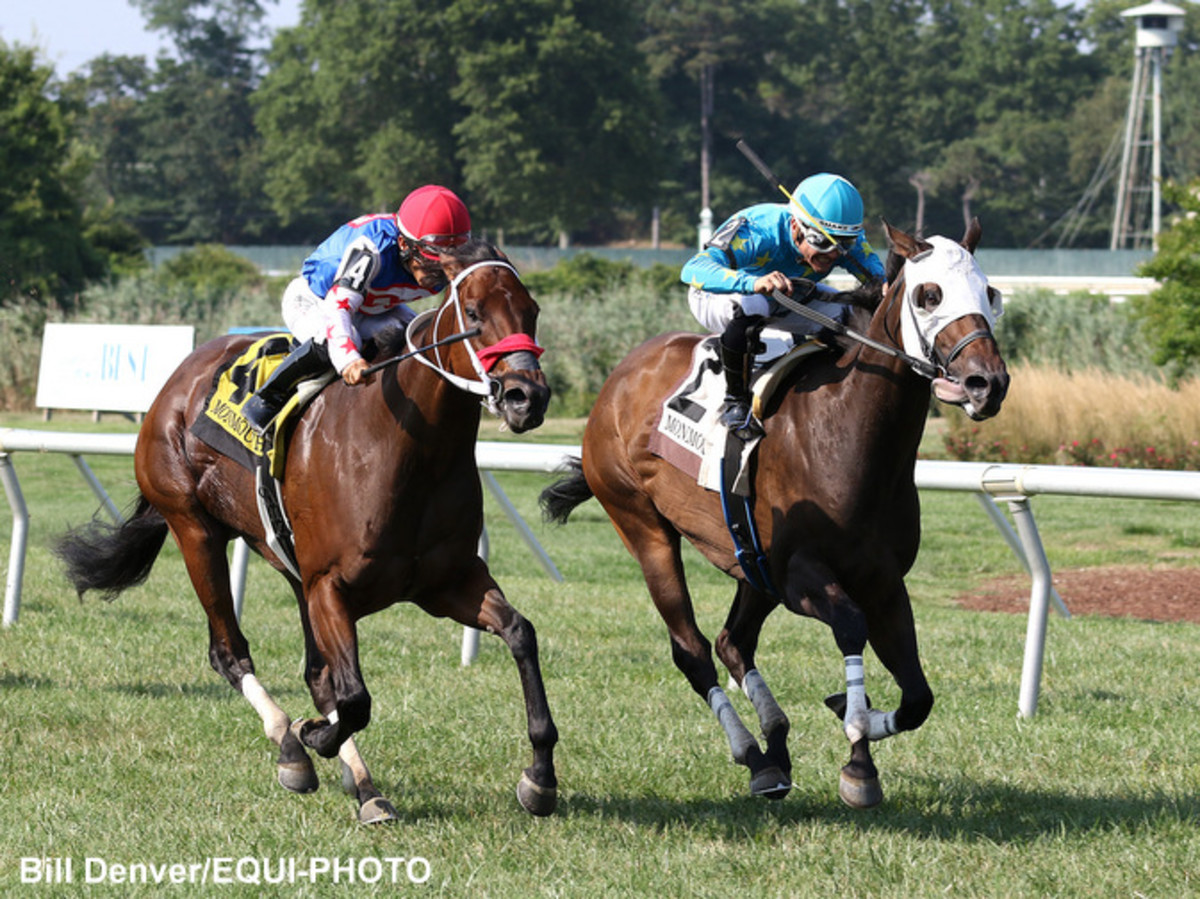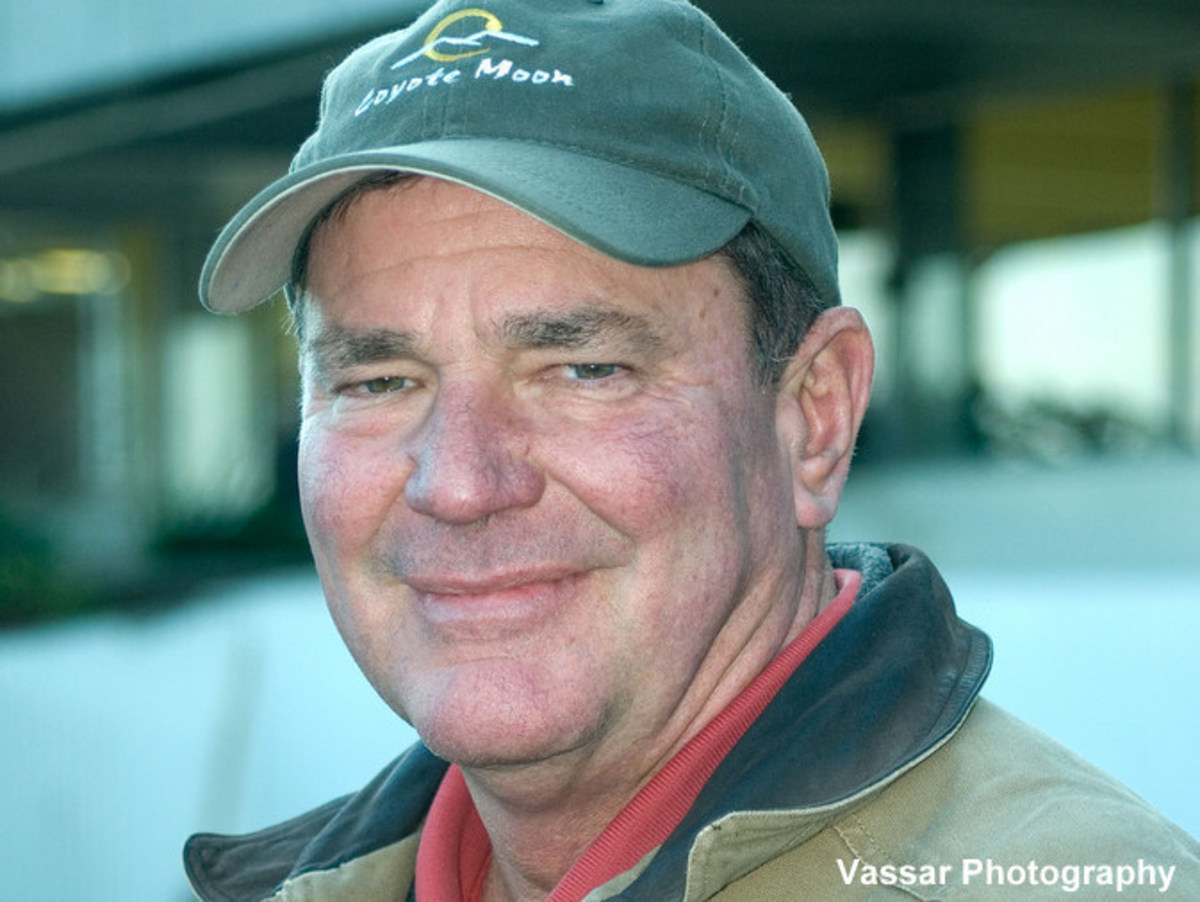It isn't always success on the biggest stage that keeps horsemen enjoying the task of waking up in the earliest hours of the morning. For 60-year-old Kathleen DeMasi, the first female trainer inducted into the Parx Hall of Fame, it's something much less tangible that keeps her love of the sport alive.
There's a moment that happens over the course of training a racehorse, she explained, when everything just starts to come together.
“When the light comes on and they really figure it out, and they start doing well for you, that's a big thrill,” DeMasi said. “When you finally get a horse to click, he's finally figured it out and is starting to do things right, and then he starts to show himself in the afternoon, that's probably the thing that really keeps me going.”
That moment isn't the same for every horse, of course, and sometimes it happens more by chance than by some grand design. All That Magic, winner of Monmouth's $104,000 Incredible Revenge by a nose in her first stakes try, was definitely the latter.
“I couldn't get a dirt race for her to go, so I decided, 'Why not try her on the turf?'” said DeMasi. “As we have found out, she's a different horse on the grass. It was a fun surprise!”
Now four-for-four in turf sprints, All That Magic's win in the 5 ½-furlong Incredible Revenge came nine days after a six-length romp at Monmouth against allowance company at five furlongs on the grass.
“I wasn't really worried about the added distance (her previous three wins were at five furlongs on the grass) because she has been drawing away in her wins lately,” the trainer continued. “My biggest concern was having just nine days rest. But she is just very good right now.”
It's hardly the first time DeMasi has had a filly step forward on the grass. The best horse she has trained, at least in terms of career earnings, was a filly named Joya Real.

“She was a horse that we had been running on the dirt, and she had knocked out a few conditions,” DeMasi said. “There was no race that I could find for her, but there was a race on the turf at Parx, and she won!”
Joya Real went on to win three stakes on the turf, and might have won a few more were it not for the rise of a tough female turf sprinter named Lady Shipman in the Mid-Atlantic around the same time. Overall, Joyal Real won 10 of her 30 career starts for earnings of over $450,000.
“Maybe I'm more apt to try a horse on the grass than some folks,” DeMasi posited. “People seem to think I do well with turf horses, especially turf fillies, and maybe it's just because I've been a little more experimental with them.”
That willingness to experiment has paid off over the course of her career: DeMasi has saddled a total of 1,744 winners thus far, including 465 under the Pewter Stable banner she launched with her husband, Greg.
Many of those Pewter Stable winners have been homebreds, the couple taking advantage of the Pennsylvania breeding program for both their own runners and a few sales yearlings. The DeMasis also stand their own stallion in the state, Winchill, a stakes-winning son of Tapit they owned and trained.
“We all know that the breeding business can be so emotionally up and down, so my hat's off to anyone who breeds a horse,” DeMasi said. “It's a good way of keeping around a quality mare rather than just selling her, but when you add up all the money and the time and the loss… We've been through it ourselves, and I've heard the stories, so to see one of those babies go on and do well is just an unbelievable feeling.
“It was really gratifying when (homebred) Winning Time won the Pennsylvania Nursery Stakes last year. He was a baby who took all summer to get ready, because he was very immature, but then he peaked at the right time and won the Nursery. Standing there in the winner's circle, it was like watching some movie made for Disney! My groom actually rubbed both the stallion and the mare, and then the baby!”
Greg DeMasi also enjoys picking horses out at the sales.
“He knows pedigrees, and I know physicals,” Kathleen DeMasi quipped. “My husband, he's such a huge sports fan, and he knows all the numbers. I think he would have made a great scout for baseball, and that's part of why he enjoys the 2-year-old sales so much. He loves trying to find the right potential in horses, and seeing them mature just like rookies in baseball.”
All That Magic was one of those picked out at the OBS Sale, purchased for $40,000. Though the filly made just one start as a 2-year-old, she's clearly blossoming in her new home on the grass.
“It's hard to win four in a row in any kind of race,” said DeMasi. “I think right now I will probably look at a race in Maryland in early September at Pimlico; I think she'll like that course. Now that she's established herself as a turf horse, we kind of can map out where we're going with her. We've always been big believers in letting the horse tell you when they're ready. They don't always have to be racing year-round.”
It's a mantra that's served DeMasi well throughout her career, dating back to 1984. It likely stems from her time spent working under Rick Dutrow Sr.; DeMasi had grown up in Pony Club, and her parents owned a few cheap racehorses, but it was nothing like the education she got in the elder Dutrow's barn.
“He was just a really great guy to work for and you learned a lot and listened and watched,” she said. “He was the kind of guy where if you make a mistake, he'd explain why you made the mistake and tell you how to fix it.”
DeMasi reflected on those early days in the racing game, looking back fondly at her time spent all over the Mid-Atlantic region.
“Back then, there was a different group of people working at the track, more families and generational horsemen,” DeMasi said. “When I was a groom, I think I had one horse that went over to the paddock with a lip chain, but now they almost all do. I question sometimes in my mind: Is it the way we're brought up in this industry, or is it the way we're breeding the horses now?
“Is that part of the reason that HISA was needed? It used to be that you apprenticed under somebody, worked under somebody, and I just think today that the old-school theory of putting in time and learning from the ground up isn't as common.
“But you have to grow with the times. I've been a board member of the Pennsylvania horsemen's association for over 15 years, which is also part of the Thoroughbred Horsemen's Association; when all this change was coming around with HISA, our organization was already sort of already doing a lot of stuff that they're doing now.”
For example, DeMasi was instrumental in getting Pennsylvania's first Thoroughbred aftercare program off the ground. Turning From Home was launched in 2008, and has provided over 3,650 former racehorses with a safe retirement.
“That's been one of the big changes I've seen in the industry,” DeMasi said. “But the whole world is changing, really. I've sort of been just quietly doing my thing in the Mid-Atlantic, so it's not like you're going to see my name all over the place. But this is what I love to do. Even though you might be tired or whatnot, just being around the horses is so enjoyable.”
The post Breeders’ Cup Presents Connections: For DeMasi, ‘Just Being Around The Horses Is So Enjoyable’ appeared first on Horse Racing News | Paulick Report.



